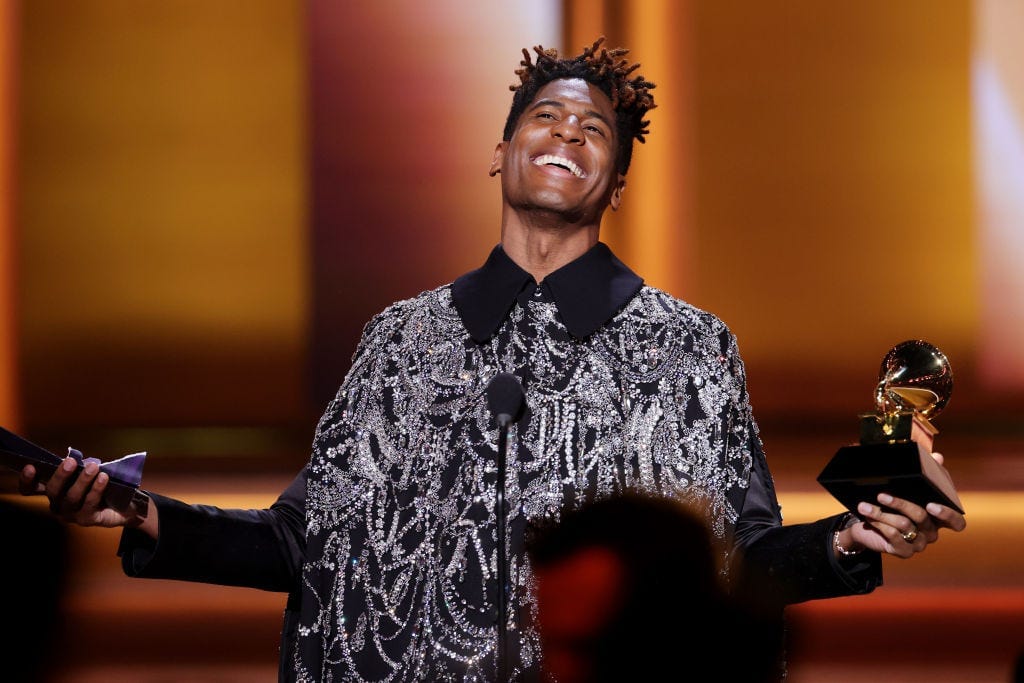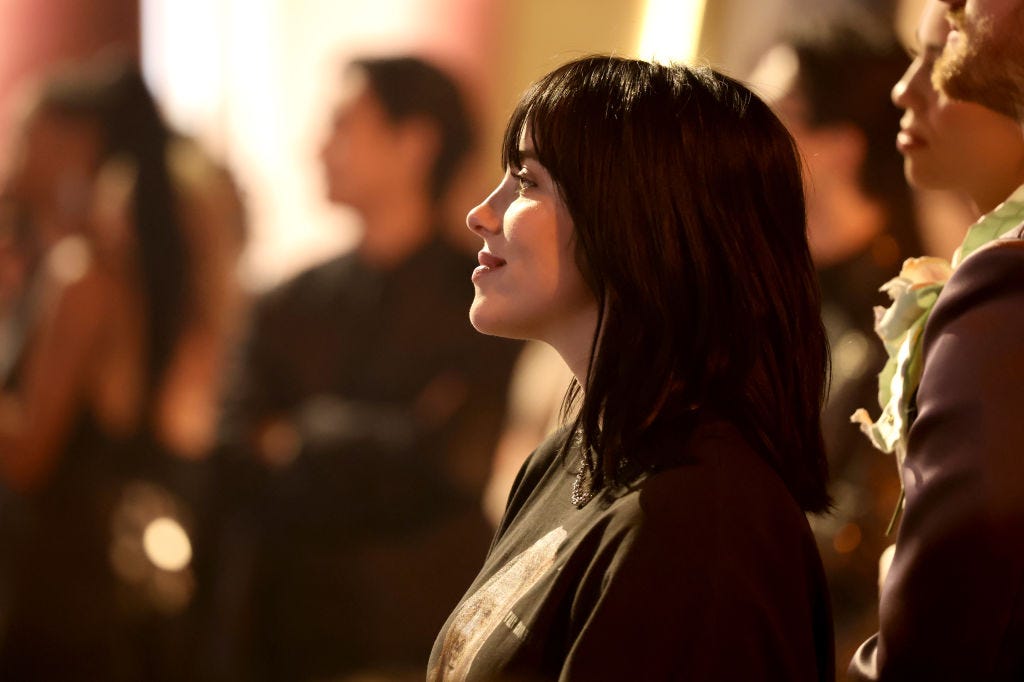Not Your Grammy's Grammys
See? Awards shows can work. Also: some last thoughts (I promise) on The Slap

Bur first, a message from the Substack home office: You can now read Ty Burr's Watch List in the new Substack app for iPhone.

Read Ty Burr's Watch List in the Substack appAvailable for iOS and AndroidGet the app
With the app, you’ll have a dedicated Inbox for my Substack and any others you subscribe to. New posts will never get lost in your email filters, or stuck in spam. Longer posts will never cut-off by your email app. Comments and rich media will all work seamlessly. Overall, it’s a big upgrade to the reading experience.
The Substack app is currently available for iOS. If you don’t have an Apple device, you can join the Android waitlist here.

Like a lot of people in my age bracket, I watch the Grammys A) to get a bead on who and what constitute “popular music” at this nano-second in time and whether it’s something I’m interested in listening to, and B) to celebrate generational icons while mourning the passing of time, because how has Joni Mitchell managed to get old when I know I haven’t? After last night’s ceremony, I’m prepared to add a third category: C) to see what an awards show looks like when it’s done right – with professionalism and panache as opposed to the middle-school production of “Guys and Dolls” that unfolded on ABC a week earlier. That doesn’t mean the National Academy of Recording Arts and Sciences doesn’t have its head up its ass in many respects, including giving Best Comedy Album to an admitted sex pest – what was it you were saying about cancel culture going too far? Still, it was a relief and perhaps even a shock to see that one of these orgies of showbiz self-love knows how to put on a show.
The difference between the Grammys and the Oscars, of course, is that Grammy nominees are all performers who perform as themselves – or as pop-persona versions of themselves – while Oscar acting nominees perform as other people and are often at a loss when it comes to “being themselves” in public. If Lil Nas X is nominated, Lil Nas X is going to play, whereas no one expects Jessica Chastain to get on stage to re-enact a scene from “The Eyes of Tammy Faye.” (Although, maybe she should. At this point, it couldn’t hurt.) It also mattered that last night’s festivities had a host, Trevor Noah of “The Daily Show,” who understood the assignment, dispensed with skits, kept the forced topical jokes to a minimum, and moved the show along on a smooth, inoffensive conveyor belt of blandishment.
— v (@ViralMaterial) 12:51 AM ∙ Apr 4, 2022
The Grammys were held in Las Vegas, at the MGM Grand Garden Arena, and if you’ve ever been to a Vegas show, last night’s production offered a similar glitzy, high-cholesterol buzz – not quite camp (because that would entail self-examination) but flaunting its peacockery without modesty or shame. The mesmerizing Busby Berkley arm choreography surrounding J Balvin’s performance of “In Da Ghetto” felt to me like a throwback to “Jubilee,” which played the MGM Grand for 25 years and was itself a throwback to elephantine stage reviews like the Ziegfeld Follies. At the Oscars, the Korean boy band BTS were brought on to shill for Disney; at the Grammys, they just did what they do – whirl through a tightly choreographed, heavily produced performance of their hit “Butter” that tickled the pleasure centers of a viewer’s brain while omitting anything remotely smacking of spontaneity. Lil Nas X performed “Montero (Call Me By Your Name)” (above) as a succession of cheerfully in-your-face costume changes that culminated in what looked like a late-career Joan Crawford musical number set in outer space.
Jon Batiste went into the night as a hugely admired jazz/R&B composer-performer and came out a pop superstar with five Grammys, including Album of the Year. Everyone looked happy to be there, looked comfortable in their own skins, whether it was Silk Sonic duo Bruno Mars and Anderson .Paak graciously cleaning up in every category in which they were nominated, new kid Olivia Rodrigo bubbling like an actual teenager with her three wins, or Billie Eilish (below) looking extremely pleased to no longer be that new kid while wearing a shirt honoring the late Foo Fighters drummer Taylor Hawkins.

There was a lot to talk about and lots to enjoy, even if you haven’t followed pop music since R.E.M. broke up or your CD player broke down. By contrast, the only thing anyone was talking about vis-à-vis the Oscars was Will Smith – still. The Sunday opinion pages were rife with the kind of print ponderings that journalists call “thumbsuckers” about who was right and who was wronged and should Smith have been arrested and has his “brand” been irreparably harmed. What is true seven days later is what was true the morning after, which is that celebrity scandals – and attitudes toward celebrities in general – are used by us for us to articulate and express our own moral values, whatever they may be. In other words, how you feel about Will Smith and Chris Rock and Jada Pinkett Smith says everything about you and, really, nothing about them. This is why people can’t shut up about it (including me, apparently).
I teach a course at Boston University called “Fame: Thinking and Writing Critically About Stars and Celebrity” that’s an outgrowth of a book I wrote on the subject a few years back (insert plug for “Gods Like Us” right… here). The class is half historical survey and half entertainment-journalism “rules of the road,” and the hardest part, year after year, is getting students to step outside their personal feelings about any given famous person, pro or con, and look at them as cultural markers to which we assign meanings that shift as the culture shifts. The stars are our version of Greek gods, yes, but they’re also the Barbie dolls we play with as a society when we try to hammer out what’s right and what’s wrong, who gets punished and how, what’s allowable behavior and what isn’t and – the hottest part of the flame – what used to be allowed but isn’t any longer. My own feelings aside, I welcome these disruptions in the celebrity matrix because people suddenly have to form concrete opinions out of hazily held assumptions and then test those opinions in the public square or the hallways at work. This is how a culture evolves (or devolves, as you will), and this is also how people show you who they are – and when people show who they are, they always reveal more than they think. So I started Thursday’s class not by asking the students who they thought was right or wrong but what Will Smith had meant to them before the Oscars telecast as an idea, a way of being in the world, and what he represented after — how race factored into that, and nostalgia, and gender, and all that gnarly stuff. And then we had a pretty good discussion about it.
If you enjoyed this edition of Ty Burr’s Watch List, please feel free to share it with friends.
If you’re not a paying subscriber and would like to sign up for additional postings and to join the discussions, here’s how:
If you’re already a paying subscriber, I thank you for your generous support.





